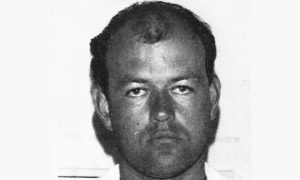
The Lord Chancellor has asked the Parole Board to reconsider its decision to allow child killer Colin Pitchfork to be released from prison.
Pitchfork was jailed for life for raping and strangling two teenage girls in Leicestershire in 1983 and 1986.
Lord Chancellor and Justice Secretary Alex Chalk said it was “absolutely vital” dangerous offenders were kept behind bars.
He said there was an arguable case the board’s decision was irrational.
Pitchfork became the first murderer to be convicted using DNA evidence.
He was jailed for a minimum of 30 years in 1988 for the murder of Lynda Mann and Dawn Ashworth.
This was later reduced to 28 years for good behaviour.
The 63-year-old was released from prison in 2021 but was arrested and sent back to prison two months later.
He was granted parole in June following a hearing held in private in April.
In a statement on Monday, Mr Chalk said: “My thoughts remain with the families of Lynda Mann and Dawn Ashworth, whose lives were changed forever by the heinous crimes of Colin Pitchfork.
“My number one priority is public protection and after careful assessment I have asked the Parole Board to reconsider their decision to release him.
“It is absolutely vital that every lawful step is taken to keep dangerous offenders behind bars.”
The Lord Chancellor is a senior member of the cabinet and heads the Ministry of Justice.
His intervention comes after the Conservative MP for South Leicestershire Alberto Costa called for the parole decision to be challenged.
Mr Costa said: “I am very grateful to the justice secretary for listening to me and my constituents by challenging the Parole Board’s deeply disappointing decision.
“Like many, I was aghast at the recent decision.
“The Parole Board now has a further opportunity to get this decision right and to ensure that Colin Pitchfork stays in prison where he belongs”.
After the decision was made public last month, a Parole Board spokesperson said: “Parole reviews are undertaken thoroughly and with extreme care. Protecting the public is our number one priority, however our sole focus in law is risk, not punishment, and must be based on evidence.
“This case is eligible for reconsideration if any party thinks the decision is irrational or unfair.”
- Colin Pitchfork, 22 at the time of the first murder, was married with two sons. He was a baker who grew up in rural Leicestershire and lived in Littlethorpe
- In November 1983 he left his baby son sleeping in the back of his car and raped and strangled 15-year-old Lynda Mann in Narborough. He then drove home and put his son to bed
- Three years later, less than a mile from where Lynda died, he raped and murdered Dawn Ashworth, also 15, of Enderby. The pathologist who examined her body described it as a “brutal sexual assault”
- A police investigation initially led to the wrong man, a local 17-year-old who falsely confessed to one of the killings. After an unprecedented mass screening of 5,000 men using pioneering “DNA profiling” technology, Pitchfork was eventually caught. At first, Pitchfork had evaded justice by persuading a colleague to take the test for him
- He pleaded guilty to both murders in September 1987 and was sentenced to life in January 1988. The judge said the killings were “particularly sadistic” and he doubted Pitchfork would ever be released
- In 2009, his 30-year life tariff was reduced by two years for “exceptional progress” – a decision that was strongly criticised by the families of his victims
- He was moved to an undisclosed open prison at some point prior to 8 January 2017, after his request for release
Source – BBC News


Share your thoughts